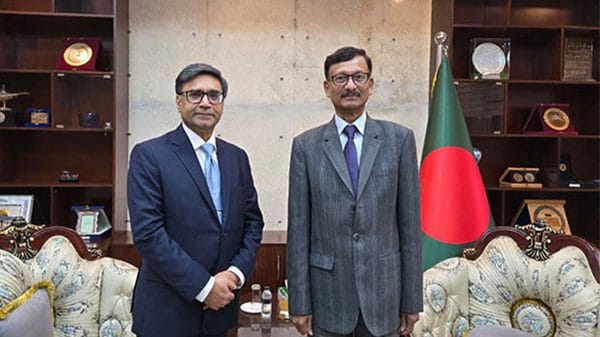New Delhi: Indian Foreign Secretary Vikram Misri raised the issue of safety and welfare of minorities in Bangladesh during his meetings with the Chief Adviser Muhammad Yunus, Foreign Adviser Md. Touhid Hossain, and with his counterpart Mohammad Jashimuddin in Dhaka Monday, while underlining New Delhi’s desire to “work closely” with the country’s interim government.
Misri, who is in Dhaka for the Foreign Office Consultations, said, “Today’s discussions have given both of us the opportunity to take stock of our relations, and I appreciate the opportunity today to have had a frank, candid, and constructive exchange of views with all my interlocutors. I emphasised that India desires a positive, constructive, and mutually beneficial relationship with Bangladesh.”
India had underlined its desire to work closely with the interim government of Bangladesh authorities, Misri said, adding in a statement, “At the same time, we also had the opportunity to discuss certain recent developments and issues, and I conveyed our concerns, including those related to the safety and welfare of minorities. We also discussed some regrettable incidents of attacks on cultural, religious, and diplomatic properties.”
The Foreign Office Consultations are the first structured dialogue between the two countries since the ouster of former Bangladeshi prime minister Sheikh Hasina on 5 August this year. Hasina, the long-time leader of Bangladesh, fled to India following months-long student-led protests over a controversial quota system in government jobs.
Nobel laureate Yunus was installed as the chief adviser of the interim government.
Ties between the two countries hit a rough patch in recent weeks, especially following attacks on Hindus and other minorities in the South Asian nation. The former leader of Bangladesh’s ISKCON Chinmoy Krishna Das was arrested by authorities in Dhaka last month, which led to further chill in ties.
The issues between the two countries have triggered protests outside each other’s diplomatic missions in both countries. Last week, protesters in Agartala breached the premises of the Bangladesh Assistant High Commission and tore a flag of the country during a protest demanding Das’s release.
Indian High Commissioner to Dhaka Pranay Verma was summoned last Tuesday by the Bangladeshi government. Members of the interim government have also called for the United Nations Peacekeeping Forces to secure the country’s missions in India in the event New Delhi cannot offer enough security for it.
In Dhaka, however, Misri struck a conciliatory tone, highlighting that Prime Minister Narendra Modi was the first leader to “greet” Yunus after he was made chief adviser.
“Since the political changes in Bangladesh in August this year, there has of course been contact between our leaderships. The Prime Minister was the first world leader to greet the Chief Advisor on his assumption of office. The two of them had a very cordial telephone conversation thereafter, and the Chief Advisor also accepted the Prime Minister’s invitation to speak at the third Voice of the Global South Summit that was held in August this year,” Misri said.
The Indian foreign secretary mentioned the enduring strength of the relationship between the two countries across sectors such as “trade, commerce, connectivity, power, water, and energy, and development cooperation, consular cooperation, and cultural cooperation”.
“There is no reason why this mutually beneficial cooperation should not continue to deliver in the interests of both our peoples,” Misri said.
(Edited by Tikli Basu)
Also read: MEA provided assistance to 1,871 distressed or abandoned Indian women abroad, highest in Dubai






